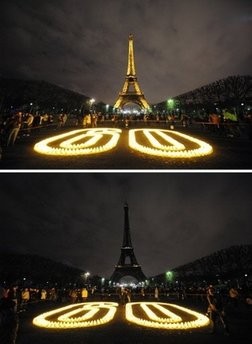PARIS (AFP) – The world's tallest building went dark, the Eiffel Tower lost its glow and lights were shut off at other sites across the globe Saturday in a campaign to boost the fight against climate change.

Ferry horns blared across Sydney harbour in a noisy start to the Earth Hour energy-saving event, involving 4,000 cities in a record 125 countries.
It was to include 1,200 landmarks from the Forbidden City to Egypt's pyramids and the Las Vegas Strip, with iconic sites going dark for 60 minutes.
"From Brazil to America, to Canada, all the way down to Australia, Japan and India -- it's a really diverse set of countries taking part this year," Earth Hour executive director Andy Ridley said.
The rolling wave of darkness was intended to boost the environmental movement after disappointing UN talks in Copenhagen in December.
The WWF-run event officially began when New Zealand's Chatham Islands switched off their diesel generators to leave just 12 street lamps burning and was to end nearly 24 hours later in Samoa.
Beijing's Forbidden City and Bird's Nest Stadium were among the participants along with other cities in China, which is the world's biggest carbon polluter and appointed giant panda Mei Lan its Earth Hour "ambassador".
But in Bangkok, city authorities were ordered to halt their Earth Hour campaign for security reasons as anti-government protesters held a major rally.
Elsewhere in Asia, the Japanese city of Hiroshima turned off the lights at 30 sites, including its Peace Memorial, set in one of the few buildings to survive an atom bomb attack during World War II.
Private homes also switched off their power. New Delhi Mum Aruna Mehra told AFP: "My daughter invited her friends over for a party to eat by candlelight" -- although others drew the line at switching off fans in the sweltering heat.
In Delhi and Mumbai, lights were switched off at shops, hotels, the Rashtrapati Bhavan presidential residence, the 17th-century Red Fort and the Swaminarayan Akshardham temple complex, one of India's largest Hindu places of worship.
India is expected to be among the countries hit hardest by rising temperatures and changes in rainfall patterns, with experts warning such problems could affect food security and displace communities.
In the Middle East, the world's tallest building, the Burj Khalifa in Dubai, had its lights switched off for Earth Hour.
Egypt participated as well, with lights shut off at the Giza plateau, plunging the three Great Pyramids, the Sphinx and the surrounding desert area into total darkness.
In Europe, some of the world's most recognisable sites faded into darkness.
More than 240 buildings and monuments in Paris participated, including the Eiffel Tower -- which only went dark for five minutes as opposed to the full hour. Some 1,600 candles were lit at its base in recognition of the event.
London's Big Ben took part, and the advertising signs at Piccadilly Circus in the city were also turned off. It is thought to be only the fourth time since World War II that the huge Coca-Cola sign there has been dimmed.
But some onlookers in Piccadilly Circus said the measures should have gone further.
"I thought it was going to be the whole of Piccadilly and it's just the screens. It should have been all the lights and all the buildings around here," said Sandra Herrera, 23, visiting from Bilbao in Spain.
Rome's Trevi Fountain, known by many through Federico Fellini's film "La Dolce Vita", was among Italy's sites involved in the campaign.
In the United States, some 30 states were on board, with Mount Rushmore, San Francisco's Golden Gate Bridge and Chicago's 110-storey Sears Tower all due to go dark.
Earth Hour started in 2007 in Sydney and enjoys widespread support both from the public and big business, including Google, Coca-Cola and McDonald's.
This year, even users of ubiquitous Twitter and Facebook could show their support with special applications that turn their displays dark.
In December, two weeks of UN talks in Copenhagen failed to produce a binding commitment to limit global warming or set out concrete plans for doing so, in a setback for the environmental movement.
























